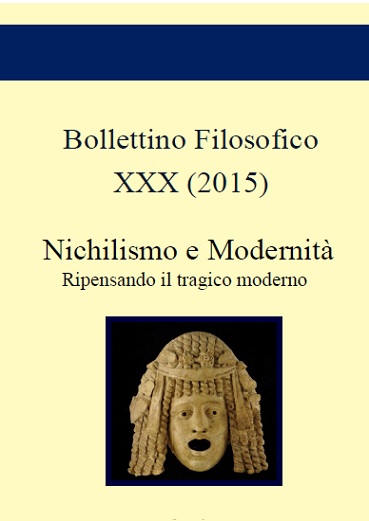From Nihilism to post-modern religion. W. Weischedel and J. Schellenberg’s historiographical proposal
DOI:
https://doi.org/10.6093/1593-7178/3701Keywords:
philosophy of religion, history of contemporary philosophy, skepticism, epistemologyAbstract
The aim of this paper is to compare W. Weischedel’s and J.L. Schellenberg’s philosophies of religion. In spite of the independence of their speculations, both use the same sources and have the same objective: proposing a philosophy of religion useful in the post-modern world. In order to do this, I will take Weischedel’s passage from nihilism to scepticism into consideration and then I will analyze his different conceptions of religious scepticism. In the analytic philosophy, Schellenberg’s trilogy proposes a similar passage suggesting that it is necessary to go beyond the contrast between theism and atheism, to appreciate the value of an epistemic scepticism able to characterize a new satge of religion. In both cases, scepticism assumes a constructive value. I will conclude that the different contexts in which these proposals have originated, make them compatible to underline the anthropological merit of religion and to formulate a philosophy of religion fit to avoid rationalism and fideism.
Downloads
Downloads
Published
How to Cite
Issue
Section
License
The author retains the copyright of his work whilst granting anyone the possibility “to reproduce, distribute, publicly communicate, publicly exhibit, display, perform and recite the work”, provided that the author and the title of the journal are cited correctly. When submitting the text for publication the author is furthermore required to declare that the contents and the structure of the work are original and that it does not by any means compromise the rights of third parties nor the obligations connected to the safeguard of the moral and economic rights of other authors or other right holders, both for texts, images, photographs, tables, as well as for other parts which compose the contribution. The author furthermore declares that he/she is conscious of the sanctions prescribed by the penal code and by the Italian Criminal and Special Laws for false documents and the use false documents, and that therefore Bollettino Filosofico is not liable to responsibilities of any nature, civil, administrative or penal, and that the author agrees to indemnify and hold Bollettino Filosofico harmless from all requests and claims by third parties.

